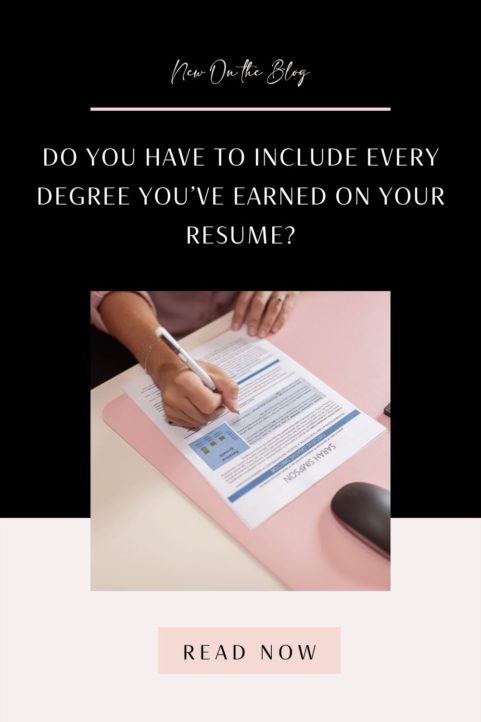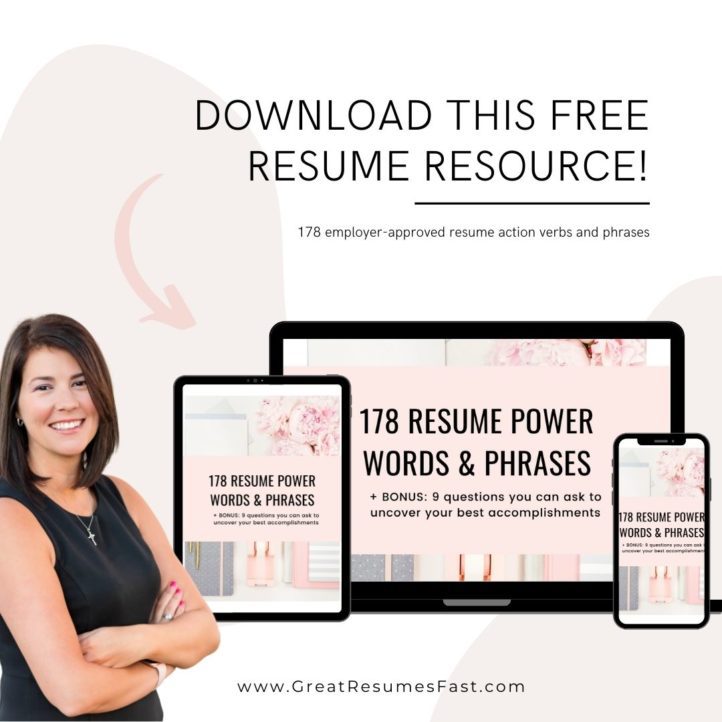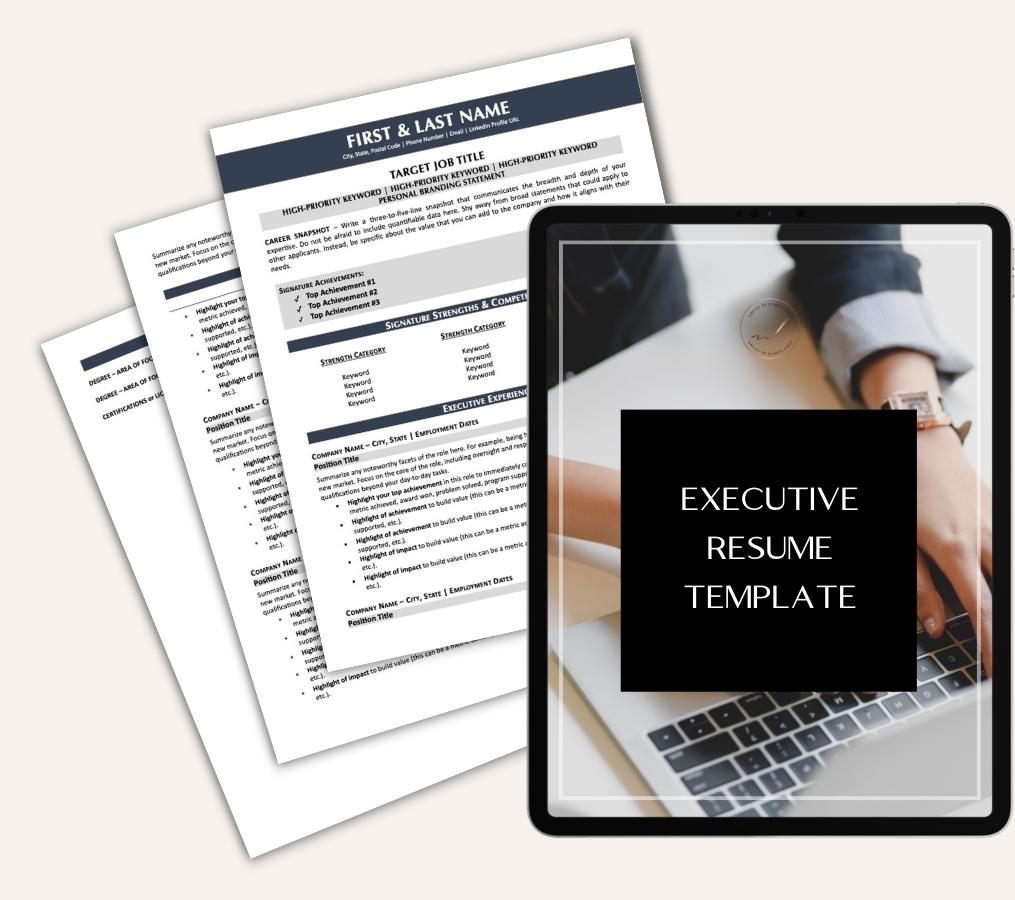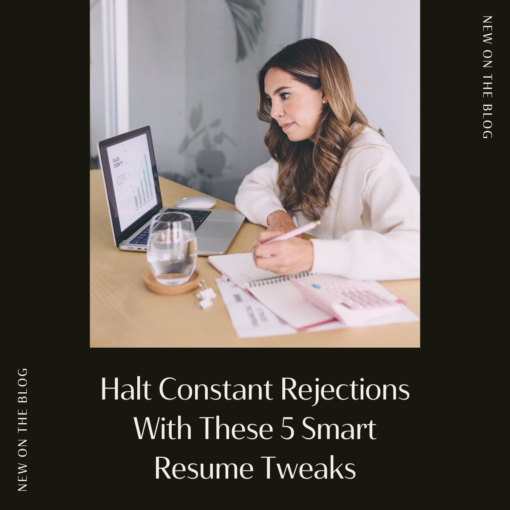Do You Have to Include Every Degree You’ve Earned on Your Resume?
Have you ever wondered if you really need to include all of your diplomas, degrees, or certifications on your resume? The answer can depend on several different factors, but the most important factor is based on your target position. Does the role you’re currently targeting require certain degrees, certifications, or credentials?
In this article, I’m sharing how to determine which of your certifications, credentials, or degrees should be included on your resume and which are safe to leave off.
Let’s jump in.

What Is Required?
First, as you set about doing your research and reviewing online job postings, look out for what the educational requirements and preferences are for the roles that you’re targeting. The preferences could be different depending on the company or role. For instance, I’ve seen job postings that state a bachelor’s degree is required but it doesn’t state what field the degree needs to be in. I’ve also seen job postings where a master’s degree is a preferred qualification.
Take time to look through several postings from your target companies so that you get a good idea of what educational credentials are required and which are preferred. The first rule of thumb is that you always want to include a degree on your resume that is a requirement if you possess it.
What Credentials or Degrees Are Preferred?
An employer might state that a master’s degree is preferred but not required. In that instance, including your master’s degree is a competitive edge that you have over other candidates because you possess a preferred qualification. It’s wise to include the degree, credential, or certification if it is preferred.
What About Degrees Not Listed as Required or Preferred?
Most of the time employers will list the highest degree they require or prefer. In which case, you can include the highest degree obtained on your resume. You don’t have to include other degrees unless you believe it would be beneficial to do so. For instance, I include my bachelor of arts degree on my resume but I don’t bother including my associate of arts. It’s assumed that if I have a bachelor’s that I earned my AA. You could take the same position when listing your master’s degree and leave off your bachelor’s degree, especially if space is the issue and you’re trying to keep your resume to two pages in length versus three pages. There’s no negative to include it if you’re more comfortable doing so. I would always recommend including the highest degree you’ve earned on your resume.
Important Tips Related to Listing Degrees on Your Resume
I want to share a couple of tips related to listing your degree or credentials on your resume.
- If a position requires a master’s degree or higher, include the credentials next to your name at the top of your resume. This makes it easy for recruiters when they’re scanning your resume.
- List your education details at the end of your resume. This is where recruiters automatically go to search for it.
- Don’t include dates if it’s been longer than three years since you graduated. Including dates from 10, 20, or 30+ years ago is unnecessary and opens the door to implicit age bias.
- If you haven’t done so already, consider removing any dates with your education on your LinkedIn profile. It’s not required to include those dates when listing your degrees or certifications on your profile.
- The most important question you want to ask when evaluating whether to include a degree, certification, or credential is whether it is relevant to the role. If it’s relevant to the role, include it.
If you haven’t finished your degree or certification yet and you’re wondering if you can include it on your resume and how to incorporate it, this article walks you through everything you need to know.
When evaluating whether to include a degree on your resume, ask yourself if the degree is required or preferred and if it is relevant to the role. If the degree is not required, preferred, or relevant to the role, you’re safe leaving it off the resume. It’s also OK to leave off an earlier degree and only include the most recent degrees especially if resume length is a concern for you.
For more tips, check out this article where I’m providing guidelines for whether to include a position on your resume and a checklist for helping you make the decision.
If you have been submitting applications and resumes to open positions but receiving zero responses, I recommend checking out The 5 Must-Have Components of an Effective Resume.

Your words carry power. With our words, we can paint a vivid picture for someone. If you are looking to increase responses to your applications, I have created this guide which includes 118 action verbs, 33 impactful phrases, and 27 strength descriptors because we all know how hard it is to convey our value and we definitely don’t want to sound like we’re bragging. Download your copy now!
I would love to connect and continue the conversation on Linkedin. You can send me an invite here.
Share this post:

About the author
Jessica Hernandez, President, CEO & Founder of Great Resumes Fast
Hi, I’m Jessica. I started this company back in 2008 after more than a decade directing hiring practices at Fortune 500 companies.
What started as a side hustle (before that was even a word!) helping friends of friends with their resumes has now grown into a company that serves hundreds of happy clients a year. But the personal touch? I’ve kept that.
You might have seen me featured as a resume expert in publications like Forbes, Fast Company, and Fortune. And in 2020, I was honored to be named as a LinkedIn Top Voice of the year!
I’m so glad you’re here, and I can’t wait to help you find your next perfect-fit position!
1 Comments
Leave a Comment
Improve Your Resume: Download Your Free Executive Resume Template Today
Are you struggling to create an executive resume that will impress employers? Download this free executive resume template and receive a series of 10 emails with expert guidance on how to write resume content that resonates with employers so you get more interviews.
It's everything you need to stand out, make an impression, and accelerate your job search.









I found it helpful when you advised me to take the time to read through several job advertisements from my target organizations so that I could have a clear picture of what educational qualifications are favored and what is necessary. The first piece of advice is that if you have a required degree, you should always list it on your CV. My sister, who intends to obtain her master’s degree this year, will find this helpful. As soon as she makes her resume, what you stated will greatly benefit her. I’ll make sure to tell her about it then.